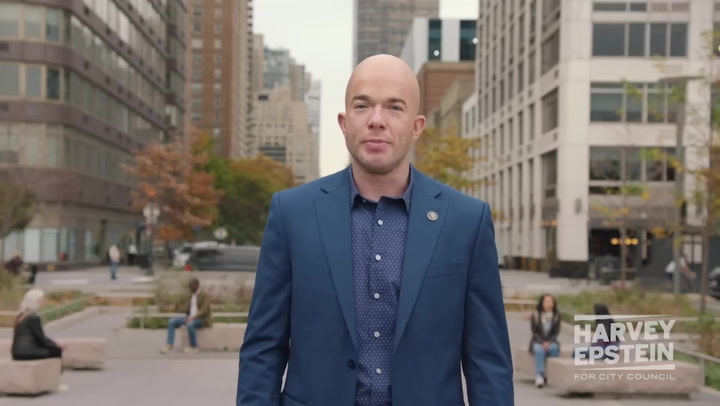
Harvey Epstein, a prominent New York assembly member and Democratic candidate for city council, found himself in the comedic spotlight recently. The catalyst was a Saturday Night Live parody led by the famous comedian John Mulaney. In an episode aired on November 2, Mulaney humorously addressed the unfortunate coincidence of sharing names with notorious figures such as Harvey Weinstein and Jeffrey Epstein. This comedic portrayal not only entertained audiences but also inadvertently drew national attention to Epstein's political ambitions.
In the sketch, Mulaney, embodying Epstein, emphasized the challenges posed by their names, joking that he is distinct from the infamous personalities associated with them. His comedic narrative highlighted the struggles and perceptions that come with sharing a name closely linked to societal taboos. Mulaney quipped on how the name 'Harvey' could just about be tolerable, but the surname 'Epstein' was an undeniable burden he had to navigate.
Epstein's acknowledgment of the sketch's humor reflects a broader understanding within political circles about the intersection of comedy and serious issues. As politicians often find themselves caricatured in popular culture, recognizing the humor can serve to humanize them amidst their relentless pursuits of public service. Mulaney's portrayal allowed Epstein to engage with a larger audience, demonstrating that politics can indeed have a lighter side.
Upon witnessing the sketch, the real Harvey Epstein responded favorably through social media, sharing Mulaney's sentiment about distancing from the associations of his name. His tweet emphasized the importance of not conflating his identity with those infamous names, which could easily overshadow his community efforts. This interaction between public figures illustrates not only the dynamics of social media but also how celebrities can influence political recognition.
Epstein leveraged the exposure from this comedic event to advocate for significant causes, including encouraging donations to the Rape, Abuse & Incest National Network (RAINN). His pointed reminder to his newfound audience about serious issues such as domestic violence underscores the effectiveness of using a light-hearted moment to raise awareness about critical societal topics. Epstein's initiative to pair humor with advocacy is a strategy not often seen, showcasing a compelling blend of politics and comedy.
Understanding the Political and Social Impact of Comedy
Comedy has always played a vital role in society, acting as both a mirror and a tool for influence. The SNL sketch featuring John Mulaney does not solely serve as entertainment; it invites deliberation on how comedy can shape perceptions of public figures. This episode unfurls the intricate relationship between humor and its potential impacts on political landscapes.
As political humor inherently involves exaggeration and parody, it can sometimes lead to misconceptions about the actual policies or characteristics of those being impersonated. In Epstein's case, Mulaney's light-hearted portrayal became a conversation starter about the politician's work and civic responsibilities. Such representations are not merely jokes; they hold the capability of engaging the audience in critical discussions regarding the individual behind the humor.
The sketch catalyzes conversations about the intersection of celebrity culture and governance, a narrative that evolves into a discourse on accountability in public service. By engaging with these comedic frameworks, politicians can foster a new understanding and relatability among constituents, which may otherwise remain elusive. Therefore, comedy acts as more than a form of entertainment; it bears the weight of social commentary, particularly in politically charged climates.
The Role of Social Media in Politicians' Responses
Social media platforms have transformed the way politicians manage their public image and respond to portrayals in popular culture. Harvey Epstein's response on X (formerly Twitter) highlights the immediate interactions possible in this digital age. Politicians no longer have to rely on traditional channels to address public perceptions or to correct misconceptions.
By utilizing social media, Epstein was able to reach a vast audience instantly, positioning himself as a relatable figure instead of a distant political entity. This direct communication channel is crucial for modern politicians who navigate a landscape that is increasingly scrutinized. Immediate feedback loops enable public figures like Epstein to clarify their messages, effectively shaping their narratives in real-time.
The importance of this immediacy cannot be understated, as social media affords politicians a platform to address sensitive topics while simultaneously engaging with humor. It creates a space for dialogue around serious issues using light-hearted references, which can disarm audiences and promote open conversations. Epstein's approach encapsulates the revolutionary changes social media has induced for political engagement.
The Aftermath of the SNL Sketch
Following the broadcast of Mulaney's sketch, the discussion surrounding Epstein has expanded beyond mere jokes. Observers noted a shift in the public's interest toward his legislative work, prompting many citizens to seek more information about his policies and advocacy efforts. This change signifies that comedy is not only capable of engaging an audience but also can lead to increased political activism.
Many constituents became curious about Epstein’s platform, policies, and civic initiatives in light of his newfound fame on a comedic stage. By addressing societal issues alongside humor, Epstein found an effective pathway to deepen connections with his constituents, allowing them to not only laugh with him but also understand his serious commitments and objectives.
The sketch has initiated conversations about the relationship between names and identities in politics. What it means to carry the legacy of someone who has committed heinous acts can inform the public dialogue surrounding ethics and public service. Harvey Epstein's blending of humor with advocacy became illustrative of how a politician can redefine narratives and engage a community in multifaceted dialogue.
In a recent episode of Saturday Night Live, comedian John Mulaney brought significant attention to New York politician Harvey Epstein, poking fun at the politician's name, which carries associations with notorious figures like Harvey Weinstein and Jeffrey Epstein. This unique blend of humor and political commentary has not only made waves on social media but has also spotlighted important issues surrounding the misuse of names in political discourse. Mulaney performed a sketch in which he impersonated Epstein, creating a memorable moment while addressing serious topics encompassed in humor.
This blend of comedy and politics is not new, but Mulaney’s approach offers a fresh perspective. Harvey Epstein, who is currently a Democratic candidate for the New York City Council, shared his thoughts on the matter publicly. He noted that while the jokes about his name can be a bit overwhelming, they also offer him a platform to discuss significant societal issues like domestic violence and public service. This scenario perfectly illustrates the power of comedy in shaping public discourse.
Indeed, Mulaney's comedic rendition humorously addressed the unfortunate alignment of Epstein's name with two infamous sex offenders, emphasizing the memorable line where he insists, “But I'm not gonna lie. The name thing has become a bit of an issue.” This self-awareness from Epstein about the absurdity of his circumstances showcases his ability to engage with the public through humor while also advocating for serious social issues.
As the SNL sketch unfolded, Mulaney's character attempted to distance himself from the notorious figures that share his name. The humor appealed to viewers while also leading them to contemplate the more profound implications of a name and one's identity in public life. Epstein’s reaction to being featured on SNL was notable, as he welcomed the media exposure and the opportunity to draw attention to significant causes.
Harvey Epstein and His Political Journey
Harvey Epstein has a unique background that has shaped his political career. As a New York State Assembly member, he has dedicated his efforts towards serving the residents of his district, advocating issues related to social justice, affordable housing, and community safety. His experiences resonate with many, making him a relatable figure for urban voters.
This recent incident further highlights the unpredictable nature of political life. Epstein acknowledges that public perception can be dramatically influenced by comedic portrayals, but he is determined to leverage these situations to raise awareness about critical issues affecting society. This approach exemplifies the intersection of humor and serious advocacy.
The sketch’s culmination featured Mulaney’s character promoting an ironic campaign slogan about “making the city Epstein's Island.” Epstein took this in stride and used the platform to engage with the audience, making it clear that humor should not detract from the seriousness of his political message. This balance is crucial for any public figure and particularly engages younger voters who value authenticity and relatability in political discourse.
Public Reaction to the SNL Sketch
The response from the public, particularly on social media platforms, has been overwhelmingly positive. Viewers appreciate Mulaney’s comedic prowess while acknowledging Epstein's willingness to embrace the situation, showcasing the resilience of public figures in the face of potentially damaging perceptions. The comedic processing of political names and identities offers both the comedian and the politician a unique opportunity.
One notable aspect of the public's reaction has been how it encourages dialogue about issues such as the importance of addressing domestic violence and support for sexual abuse survivors. Epstein, understanding this potential, made a call to action through his social media, asking followers to support organizations like the Rape, Abuse & Incest National Network (RAINN). This strategic use of his newly garnered visibility speaks volumes about his commitment to advocacy.
Furthermore, online discussions have led to broader conversations about accountability in public office and the responsibility that comes with public image. Mulaney's satire does not diminish Epstein's qualifications as a candidate but rather adds another layer to his identity, emphasizing the importance of understanding one's public persona amidst the chaos of political humor.
In conclusion, Harvey Epstein’s reaction to John Mulaney’s SNL sketch serves not only as a moment of comedy but also as a powerful reminder of the impactful nature of humor in politics. It shows how lighthearted moments can lead to meaningful discussions and community mobilization, especially around issues that require urgent attention.




.webp)
